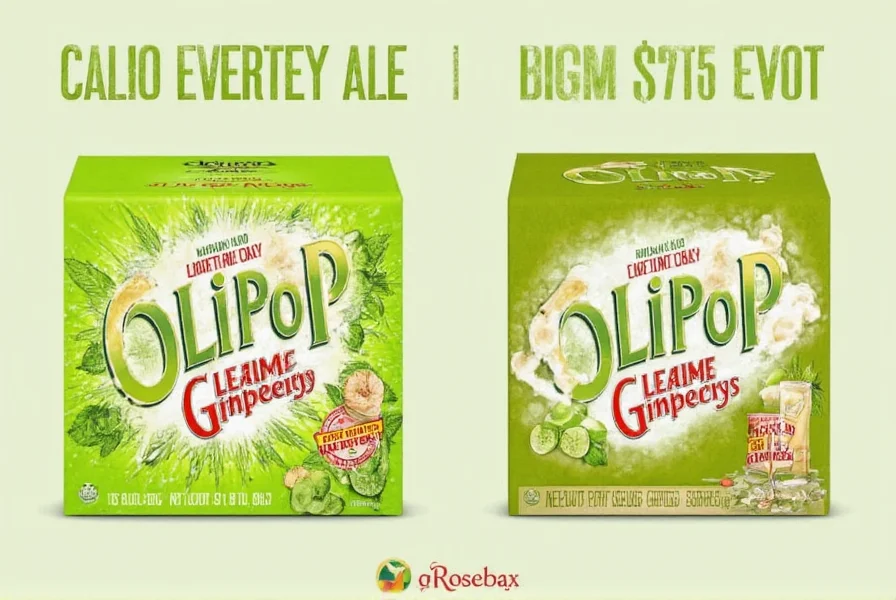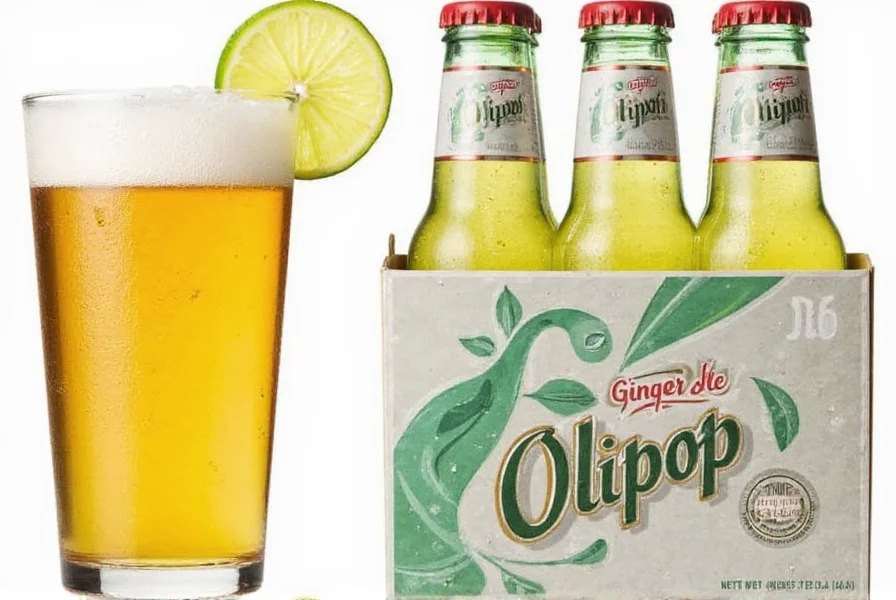When exploring olipop ginger ale ingredients, you'll discover a formulation that sets it apart from conventional soft drinks. This popular functional beverage has gained attention in the gut health space, but understanding exactly what makes it different requires examining its composition and purpose.
What Makes OLIPOP Ginger Ale Unique
OLIPOP ginger ale belongs to a new category of functional beverages known as "prebiotic sodas." Rather than relying on high-fructose corn syrup and artificial ingredients like many traditional ginger ales, OLIPOP uses a proprietary botanical blend called the OLISMART™ formula. This formula combines prebiotic fibers with plant extracts to create a beverage that supports digestive health while delivering refreshing flavor.
The key differentiator when considering olipop ginger ale vs regular ginger ale lies in the nutritional profile. Traditional ginger ale typically contains 20-30 grams of sugar per 12-ounce serving with no fiber, while OLIPOP ginger ale contains significantly less sugar and added prebiotic fiber.
Nutritional Comparison: OLIPOP vs Traditional Ginger Ale
| Nutrient | OLIPOP Ginger Ale (12 fl oz) | Traditional Ginger Ale (12 fl oz) |
|---|---|---|
| Calories | 35-50 | 120-140 |
| Sugar | 2-5g | 25-30g |
| Total Carbohydrates | 9-14g | 30-35g |
| Dietary Fiber | 2-4g (prebiotic) | 0g |
| Artificial Ingredients | None | Common |
Key Ingredients Analysis
Understanding olipop ginger ale ingredients reveals why it's positioned as a functional beverage. The formula includes:
- Cassava Root Fiber - A prebiotic fiber that feeds beneficial gut bacteria
- Jerusalem Artichoke - Another source of inulin, a prebiotic fiber
- Ginger Root Extract - Provides the characteristic ginger flavor and potential digestive benefits
- Quillaia Extract - A natural foaming agent from soapbark tree
- Natural Flavors - Botanical-derived flavor compounds
- Carbonated Water - The base of the beverage
- Trisodium Citrate - A buffering agent
- Erythritol and Stevia - Natural sweeteners contributing to low sugar content
Unlike products making unsupported health claims, OLIPOP ginger ale doesn't contain probiotics (live bacteria), but rather prebiotics (food for existing gut bacteria). This distinction is important when evaluating is olipop ginger ale healthy claims.

Taste Profile and Sensory Experience
When evaluating olipop ginger ale taste review experiences across multiple consumers, several consistent observations emerge. The beverage delivers a ginger-forward flavor but with less intense spiciness than traditional ginger ales like Canada Dry or Schweppes. The carbonation level is moderate, and the mouthfeel is slightly different due to the prebiotic fibers, which can create a subtle creaminess.
Many first-time drinkers note an adjustment period as the taste differs from conventional sodas. The reduced sugar content means it's not as aggressively sweet, allowing the botanical notes to come through more clearly. Some consumers detect subtle notes of citrus or other complementary botanicals in the background.
Understanding the Prebiotic Benefits
When examining olipop ginger ale prebiotic benefits, it's essential to maintain realistic expectations. The prebiotic fibers (cassava root fiber and Jerusalem artichoke inulin) serve as food for beneficial bacteria already present in your gut. Regular consumption as part of a balanced diet may support digestive health, but it's not a cure-all solution.
Research suggests that consistent daily intake of prebiotics (typically 5-15 grams) can support gut microbiome diversity. With 2-4 grams per can, OLIPOP ginger ale contributes to this goal but shouldn't be considered a primary source. The olipop ginger ale for digestion benefits are modest and work best when incorporated into an overall gut-healthy lifestyle.
Who Might Benefit Most from OLIPOP Ginger Ale
Based on the formulation, certain groups may find OLIPOP ginger ale particularly suitable:
- Individuals seeking lower-sugar alternatives to traditional sodas
- People interested in incorporating more prebiotics into their diet
- Those who enjoy ginger flavors but want a less intense option
- Consumers following low-sugar or reduced-calorie dietary patterns
- People looking for functional beverages without artificial ingredients
It's worth noting that individuals with specific digestive conditions like IBS may need to monitor their tolerance to prebiotic fibers, as these can cause bloating or discomfort in sensitive individuals.

Realistic Expectations for Health Benefits
When evaluating olipop ginger ale benefits, it's crucial to separate marketing from science. While the beverage contains beneficial prebiotic fibers, it's still a processed product. The health benefits are modest and should be viewed as complementary to, not replacement for, a diet rich in whole foods.
Unlike medical treatments or supplements with clinically proven effects, functional beverages like OLIPOP ginger ale offer incremental support. The olipop ginger ale nutritional facts show improvements over traditional sodas, but it shouldn't be considered a health food. Moderation remains key, as excessive consumption of even lower-sugar beverages can impact dietary balance.
Making an Informed Choice
When deciding whether OLIPOP ginger ale fits your lifestyle, consider your personal health goals, taste preferences, and budget. At a higher price point than conventional sodas, it represents a conscious choice for those prioritizing certain ingredients and nutritional profiles.
The growing interest in olipop ginger ale for digestion reflects broader consumer trends toward functional beverages, but individual results will vary. As with any dietary choice, consistency and overall pattern matter more than any single product.
Does OLIPOP ginger ale contain actual probiotics?
No, OLIPOP ginger ale does not contain live probiotic cultures. It contains prebiotic fibers (cassava root fiber and Jerusalem artichoke inulin) which serve as food for the beneficial bacteria already present in your gut. This is an important distinction between prebiotic and probiotic products.
How much sugar is in OLIPOP ginger ale compared to regular ginger ale?
OLIPOP ginger ale contains only 2-5 grams of sugar per 12-ounce can, while traditional ginger ale typically contains 25-30 grams of sugar in the same serving size. The sugar in OLIPOP comes primarily from natural sources and is significantly reduced through the use of alternative sweeteners like erythritol and stevia.
Can OLIPOP ginger ale help with digestive issues?
OLIPOP ginger ale contains prebiotic fibers that may support digestive health as part of an overall balanced diet. However, it's not a treatment for digestive conditions. Some people find the ginger content soothing for mild digestive discomfort, but those with specific digestive conditions like IBS should consult a healthcare provider, as prebiotics can sometimes exacerbate symptoms in sensitive individuals.
Is OLIPOP ginger ale suitable for people following a keto diet?
OLIPOP ginger ale can fit within a keto diet for many people, with 2-5g of net carbs per can (total carbs minus fiber). However, individual carb tolerance varies on keto diets, so those strictly following keto should account for these carbs in their daily allowance. The beverage contains no artificial sweeteners that typically concern keto dieters.
How does the taste of OLIPOP ginger ale compare to traditional ginger ale?
OLIPOP ginger ale has a more subtle ginger flavor compared to traditional ginger ales like Canada Dry or Schweppes. It's less sweet and less spicy, with a cleaner finish. Some consumers note a slight difference in mouthfeel due to the prebiotic fibers, which can create a subtle creaminess not found in conventional ginger ales.











 浙公网安备
33010002000092号
浙公网安备
33010002000092号 浙B2-20120091-4
浙B2-20120091-4